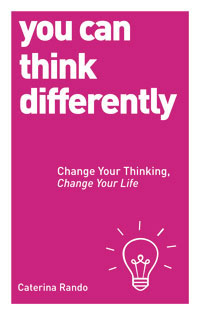
Fig & Lentil Salad from Virtually Vegan
Summer and salad go hand-in-hand and this offering from Heather Whinney’s Virtually Vegan is a fresh, sweet, figgy take on a summertime staple. Complete with a harissa
Your ‘Personal Perspective’ influences your thoughts, opinions, choices, actions, and ability to make changes
Aside from your IQ there is another aspect to your thinking that influences every thought you have. Which of these 7 personality types sounds the most like you?
“I call it your Personal Perspective”, explains Master Certified Coach and author of You Can Think Differently, Caterina Rando. “This is your basic attitude to life, the way you tend to look at the world, unconsciously and consistently. With its roots in your culture, upbringing and life experiences, your Personal Perspective influences your thoughts, opinions, choices, actions, and ability to make changes”.
Which one sounds the most like you? While you may sway from one to the other at different times, you will have one primary Personal Perspective.
Idealists have faith that things can happen just by believing they can happen. They see the world as a good place, and they are convinced that they can make a contribution to the planet and the lives they touch.
Difficulties: Idealists tend to believe what they are told and may easily be taken advantage of. They can act before asking questions and gathering all the facts or considering the consequences. They are big dreamers, sometimes too big – meaning that they hope that things will happen rather than having to make them happen. They often stay in unappealing situations for too long because they believe that “things will work out”.
Challenge: Ask more questions, examine your feelings and pause more often to consider possible outcomes of your actions and beliefs. Think about opportunities before seizing them.
Realists do not sugar-coat anything. They are persuaded by facts and evidence rather than by hypothetical visions or emotional pleas.
Difficulties: Realists prefer to be sure of success before they take action. They do not act on faith or work things out as they go along. This can limit their openness to opportunities.
Challenge: Be willing to act without trying to predict down to the last detail how things will work out. Allow yourself to be surprised.
Pragmatists are often well-balanced people who are flexible in their perspective – they are sometimes realists, sometimes dissenters, sometimes idealists and sometimes questioners. They often acquire a reputation for being reasonable, and for being good judges. However, their outlook is rarely predictable in advance.
Difficulties: They are unlikely to act on instinct and can go back and forth endlessly before making a decision. This can place relationships under strain.
Challenge: Limit your thinking time before taking action. Be willing to choose one perspective at a time and go with it. You could also benefit from building up your intuition.
The doubter in the crowd. Questioners have to see something to believe it and will not take your word for it. They often stand on the perimeter and keep their thoughts to themselves. Difficulties: Questioners often do not try things because they have not been proven, delaying action until it may be too late. They often let life pass them by.
Challenge: Allow for the possibility that people and situations sometimes really are as they appear. Don’t let your scepticism stop you from taking action whenever it might serve you.
Stoical people show fortitude, but they neither perceive nor express much emotion. Their feelings are difficult to read. They are generally “strong, silent types”.
Difficulties: People find it hard to know them or get close to them.
Challenge: Seek to be more aware of your feelings, and develop ways to express them. Note the positive effects of reaching out to others emotionally.
Visionaries have a unique way of looking at life. The “energy” of a situation or action – whether it “feels right” – is their most important consideration.
Difficulties: Their focus on energy means that visionaries can miss or ignore facts, signs and consequences that others see. They can appear to be out of touch with reality.
Challenge: Focus more on what is practical and realistic – the probable as opposed to the possible. Consider consequences. Take advice from friends who can offer a realistic perspective on important situations.
Dissenters do not expect people to be sincere and honest. They do not expect good things to happen to them.
Difficulties: A dissenter will usually be labelled as negative. Dissenters miss out on many of life’s keenest pleasures.
Challenge: Wake up to the idea that life is wonderful! People can be good and good things can come your way. Release your negativity. Embrace power thinking.
Imagine yourself in the following situation:
One night you have a really vivid dream that you win the lottery. The winning numbers are amazingly clear and you remember them when you wake up. Do you:
(a) Dismiss it as “just a dream” and forget about it.
(b) Think the dream is probably nonsense – but you’ll still be curious to see if any of the numbers come up.
(c) Doubt whether anything will come of it but see no harm in playing the numbers in the lottery.
(d) Get really excited by the dream and buy a lottery ticket on the way to work?
Depending on your answer, you are probably: a dissenter (answer a); a questioner (b); a pragmatist (c); or a visionary (d).
Which personality type are you? We’d love to know in the comments below!
Do you ever feel like you’re holding yourself back? Your personality type, or Personal Perspective, has a great influence on the way you think and act. If you fully understand your Personal Perspective, and the impact it has on your everyday life, you can learn to free your mind of negative attitudes, focus and prioritise. Then nothing can stop you!
With 20 specially devised exercises, You Can Think Differently will teach you how to recognize and evaluate your own personality, and give you the tools you need to lead the life you want.

“Change Your Thinking, Change Your Life”
You Can Think Differently by Caterino Rando
144 pages • Illustrated • £6.99
AUS $14.99 NZ $17.99
£5.99 l Buy the e-book now!

Summer and salad go hand-in-hand and this offering from Heather Whinney’s Virtually Vegan is a fresh, sweet, figgy take on a summertime staple. Complete with a harissa

Too Good to Waste by Victoria Glass is THE guide to getting the very most out of your food, in the most delicious way possible! So much

Today we’re sharing a much coveted Real Bread: Slow Dough recipe – Cinnamon and Hazelnut Knots! These sweet knots are beloved all over Scandinavia, whip

We’re gearing up for the publication of French Countryside Cooking by Daniel Galmiche, coming your way on May 14th (pre-order your copy right here)! To celebrate, we’re sharing

Watkins Media Limited
Shepperton House unit 11
89 Shepperton Road
London, England
N1 3DF

Watkins Media Limited
Shepperton House unit 11
89 Shepperton Road
London, England
N1 3DF